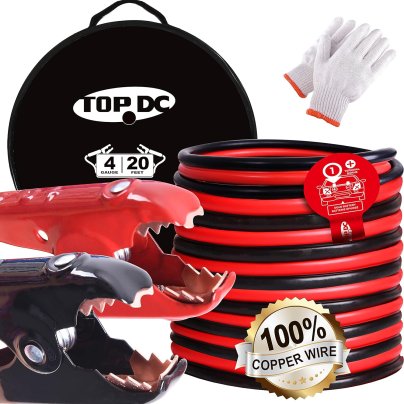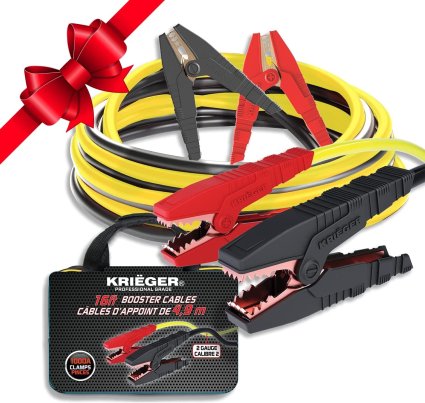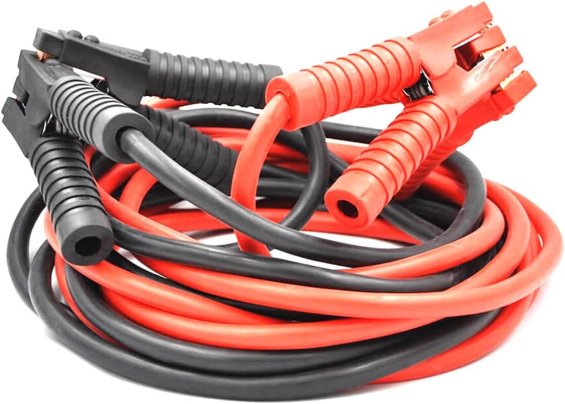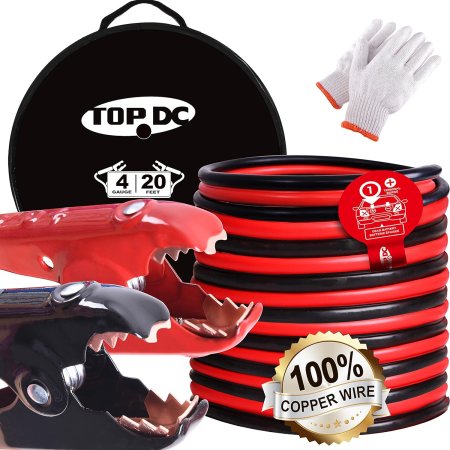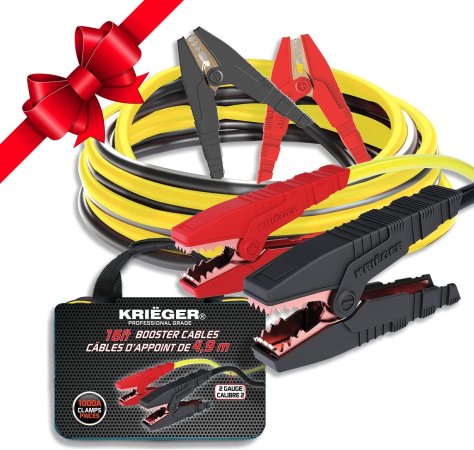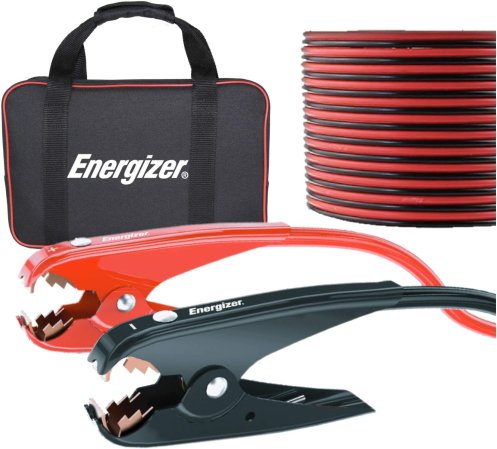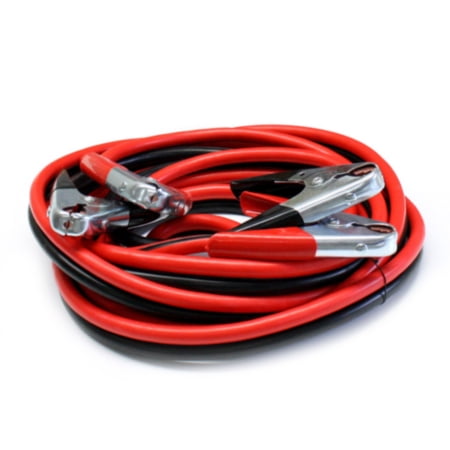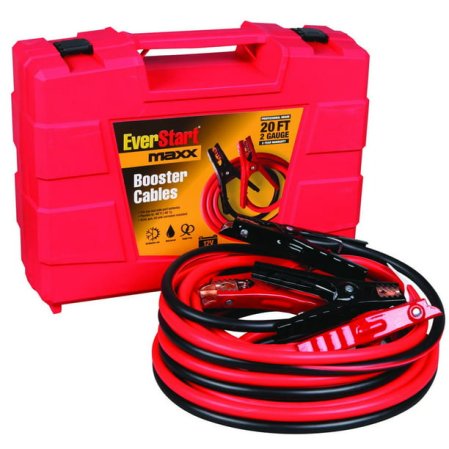We may earn revenue from the products available on this page and participate in affiliate programs. Learn more ›

Jumper cables were a big deal when I was growing up. I spent a lot of my childhood and young adult years at the drive-in movie theater. (In fact, the Sunset Drive-In in San Luis Obispo, Calif., is still open—owned and operated by the same family since 1950.) At the end of every double feature, there was at least one guy stumbling across the parking lot asking for a jump—he probably forgot to use the ignition’s accessory position. Jump starts were such a common occurrence, they should’ve sold jumper cables in the snack bar.
Jumper cables, also called jump leads or booster cables, have a singular focus. They are meant to transfer power from one vehicle to another — or from an energy source of the same voltage—when a car battery has lost charge to the point it cannot start the vehicle’s engine. The thing about jumper cables and all of your automotive emergency gear is that you don’t need them until you really need them. And unless you’ve got a manual-transmission car that can be started with a good push, you’re really going to need some jumper cables.
Listed here are my top choices for your jump-starting pleasure, whether it’s for an abandoned car in your driveway or just in case you leave the radio on for two full-length Lord of the Rings sagas.
Summary List
- Best Overall: TopDC Copper Jumper Cables
- Best Value: Kriëger Jumper Cables
- Premium Pick: Xincol Heavy-Duty Booster Cables
- Best Lightweight: Energizer Heavy-Duty Jumper Cables
- For Hard-To-Reach Batteries: DieHard Booster Cables
- Honorable Mention: EverStart Booster Cables
Our Methodology
These jumper cables were selected using the same rubric I’d use in choosing the right set for a family member’s car. (I have a very large family, and everyone who drives must have a full set of emergency equipment in their vehicle, so says the bossy oldest sister, who’s also a mechanic.)
The jumper cables must be safe and easy to use. Cable material and insulation should be of a high grade while also being affordable. Pure copper wire is the best choice for conductivity and safety, followed by copper-clad aluminum (CCA) and copper-clad steel (CCS). The length and thickness are important, since flexibility and weight are a concern, and the alligator clamps that will attach to the batteries should grip tightly while being easy to use and well insulated.
The cables should include a carrying case for secure storage, and a long warranty is preferable. Our methodology for selection is explained further on The Drive’s Gear About page.
Best Jumper Cables: Reviews & Recommendations
Best Overall: TopDC Copper Jumper Cables
Pros
- Pure copper cables
- Flexible
- 20-foot cord
- Heat resistant
Cons
- Heavy
- Less insulation on clamps
- Not for use with heavy-duty vehicles
The best conductor of electricity when it comes to jumper cables is copper wire. This TopDC selection is made of 100 percent copper wire, instead of the more common copper-clad aluminum, so it is more resistant to heat, is more flexible, and needs less insulation on a thinner gauge, so it weighs less. This 4-gauge set is made for regular passenger cars and is rated to work in very high and very low temperatures—minus 40 to 167 degrees Fahrenheit—and comes with a step-by-step guide to jump-starting a car.
Our choice is the 20-foot length, which makes it possible to jump a car from one parked directly behind it. The clamps seem to be sufficient, although I would prefer them to be better insulated, and it is on the pricier side, although not unreasonably so. What makes these an even better choice is that they come with a storage bag and safety gloves.
Best Value: Kriëger Jumper Cables
Pros
- Nicely insulated, comfortable clamps
- Handy carrying bag
- Can be used with cars, trucks, and SUVs
- Great value
Cons
- Shorter cable
- Made of copper-clad aluminum
- Weak clamp springs
Price is a factor when considering gear for your car, and jumper cables are no exception. From Kriëger comes a set in several lengths and gauges. Lengths to choose from as a value option include 16, 20, and 25 feet. The thicker the gauge, the lower the number, and these come in 1, 2, and 4 gauge. There’s also a 2-gauge pure-copper set available that is 30 feet long, but it comes with a triple-digit price tag.
The 16-foot length we chose may not be ideal for all situations, but it allows for some maneuverability when getting a jump-start, and it’s the least expensive. The clamps are the star, with comfortable grips that are well insulated with thick plastic. They’re also coated with vinyl to resist corrosion, but the springs on them are said to be a little too weak by customers. These cables also come with an attractive storage bag and a two-year warranty.
Premium Pick: Xincol Heavy-Duty Booster Cables
Pros
- Pure copper
- 20 feet long
- Storage bag
- Cables are separate
Cons
- Heavier than others
- Expensive
Xincol has been manufacturing electronics for more than 15 years, and its jumper cables made of pure copper wire are an excellent option in this market. They come in a variety of lengths, 10-, 13, 16-, and 20-feet long, and they are rated to withstand the most extreme outdoor temperatures. The 1-gauge cables are not fused together as they are with most of the choices, so the wires are more flexible and easier to roll up and store. Still, the thickest gauge available means that this set can be used on all cars, trucks, and SUVs without the worry of a meltdown.
These jumper cables have thick insulation and, of course, the best electrical conductivity since they’re made of copper and not just copper-clad wires. It’s on the pricier side, but it’s a bargain for pure copper cables.
Best Lightweight: Energizer Heavy-Duty Jumper Cables
Pros
- Two-year warranty
- Very lightweight
- Thickest gauge
- For use on even heavy-duty vehicles
Cons
- Minimal clamp insulation
- Pricier than some options
Just like the U.S. Postal Service, Energizer says its jumper cables will deliver in rain, sleet, and dead of night—as well as windstorms and searing desert heat. The set is rated to withstand extreme temperatures, the copper-clad aluminum wires should remain flexible at sub-zero temperatures, even if your joints can’t. It’s hard to believe that a 25-foot long set of copper-clad aluminum jumper cables could only weigh two pounds while a 16-foot length weighs three times that much, but reviewer statements bear that out. Even a small child could probably hoist these cables and run them over to an adult on jump-start duty.
These cables come in lengths of 16, 20, and 25 feet, but all of them except the longest are 4 gauge. The longest set is 1 gauge, so it can be used on cars, trucks, and SUVs. Although the clamps have a vinyl coating on all parts your hands should touch, there is the possibility that the coating could wear at the joints and leave bare, conductive metal right where you’d hold them. The price is on the higher side for CCA cables, but the set has a two-year warranty, which bodes well for its durability. It comes with a handy storage bag as well, emblazoned with the Energizer name.
For Hard-To-Reach Batteries: DieHard Booster Cables
Pros
- Heavy duty
- Good for side-post batteries
- 20 feet long
Cons
- 30-day warranty
- Clamps have minimal insulation
- No storage bag
DieHard’s jumper-cable offering made of copper-clad aluminum wire comes in only one length, but it’s 20 feet long, which leaves some length to maneuver if the vehicles aren’t able to meet face to face. The cables have a tough PVC outer insulation, and DieHard claims that the cables are resistant to tangling. They’re also flexible and connected to each other, which makes them easier to pack away and more difficult to lose.
These cables are 2 gauge, so the wires are thick enough to jump-start heavy-duty trucks as well as cars and SUVs. The clamps leave something to be desired as the insulation is minimal, although the clamps are made of aluminum and the actual alligator teeth are CCA. Unfortunately, this set does not come with a storage case or bag.
Honorable Mention: EverStart Booster Cables
Pros
- Molded case
- 2 gauge
Cons
- Clamp insulation lacking
- Copper-clad aluminum
- Pricey for CCA
Who doesn’t like a plastic molded case? I love them for safe storage that’s dedicated strictly to its product. No wondering what’s in the box a la Brad Pitt in Seven; it comes labeled with the exact contents. This case is specifically for EverStart’s 2-gauge copper-clad aluminum jumper cables, which are designated for heavy-duty vehicles as well as cars and SUVs. The cables are 20 feet long, and that’s enough to connect most passenger cars in a variety of positions, even if the donor car is parked directly behind the dead car.
EverStart claims the cables are good for use down to minus 40 degrees Fahrenheit, and it touts a tangle-free design. The clamps have a vinyl coating, which is less than desired insulation, but it’s sufficient. Best of all, it comes to you inside a handsome carrying case just right for tucking away for a rainy day—or at least one in which you need a jump.
Our Verdict on the Best Jumper Cables
Our top choice in the world of jumper cables is the set by TopDC, found on Amazon. Finding a set of pure copper cables for that price is unheard of. Get the thickest gauge of copper wires you can afford, especially if you drive an SUV or a truck. Heavy-duty cables allow more electricity to pass through the insulated wires, making it easier to ensure a charge even in adverse weather conditions.
What to Consider When Buying Jumper Cables
Types of Jumper Cables
Pure Copper
Quality jumper cables are made with 100 percent copper wire. Although they’re more expensive, copper cables are more flexible, have a higher melting point, and are more durable than any other type. Pure copper cables have the lowest resistance and the highest electrical conductivity, which means you can use thinner gauge cables for the same job than other types require. In other words, you’ll save space in your trunk because your cables are smaller.
Copper-Clad Aluminum
Copper-clad aluminum, or CCA, is the most prevalent type of jumper cables on the market. Like it says on the tin, these wires are made of aluminum with a thin copper coating. They are less expensive than pure copper, but the difference in conductivity means the cables need to be of a thicker gauge and have thicker, more extensive sheathing and insulation, which will make them bigger and heavier and storing them will be a more difficult task.
Copper-Clad Steel
Copper-clad steel, or CCS, is tougher than aluminum or copper wire, but it’s also less flexible and heavier. It’s also a lot less conductive than pure copper or CCA. Steel and aluminum wire has a higher resistance as well, meaning it is more susceptible to overheating and fire danger. Although CCS cables are less expensive, they are also prone to failure at the point of connection with the clamps, which can be dangerous for the vehicles and the users.
Jumper Cables Key Features
Cable Material
When shopping for jumper cables, the actual wire used is important. As mentioned above, the best grade of jumper cables are those with pure copper wire, since they are the most durable and flexible, and they conduct electricity best out of all the types. However, they are also the most expensive option.
Cable Thickness
The thickness of the cables is crucial to electricity delivery. The thicker the cable, the easier it is for electricity to flow from one battery to the other. The thickness of the cable is measured by gauge. A lower gauge number means a thicker cable. So, a four- to six-gauge is good for most passenger cars, and a one- or two-gauge is better for trucks and other heavy-duty vehicles. The drawback with a thicker gauge is that it makes the cables less flexible and more difficult to store.
Cable Insulation
You have two types of insulation wrapped around each jumper cable. There’s an outer sheath that keeps the wires safe from oil and chemicals as well as safeguarding against fire or shock. Inside of that is a sheath of protection from electrical leakage that also preserves the wire’s integrity. The rubber or rubberized plastic insulation should be tough while remaining flexible, even in colder temperatures.
Cable Length
The length of your jumper cables is something that won’t seem like a problem until you need to use them. Ten feet seems like it would be long enough to span the distance between two vehicles, but it’s not always possible to get that close. Longer jumper cables that are 20 or 25 feet long make it easier to connect in more situations. With cables this long, in most cases you’ll be able to. There are 100-feet-long jumper cables, but if you’re that far away from another roadgoing vehicle, you might have other issues.
Clamp Quality
Alligator clips are the best at handling clamp duty. It’s important that the clamps are strong and hold on tightly. Last thing you want is to have a clamp shake loose while charging. There are as many types of alligator clamps as there are manufacturers of jumper cables. Finding ones that fit your hand well, have easy action, and come with well-insulated grips will make the task of jump-starting simpler and safer.
Storage
Setting up your vehicle with emergency equipment is part of being a responsible driver, and jumper cables certainly should be part of that kit. You’ll want to keep your jumper cables secure and safe while tucked away. Having a bag or a molded plastic case to keep them in will come in handy and be easier to access until you need them. Look for jumper cables that include some type of storage system.
Warranty
What good is a product if the company won’t stand behind it? A good indicator of how long a set of jumper cables might last is the length of the warranty. Five years, as with the Krieger cables, is a great guarantee; 30 days for the DieHard set (and only protecting against manufacturer defects) ain’t so good.
Jumper Cables Pricing
The cost of a set of jumper cables can run anywhere from $15 for flimsy, eight-gauge wires at the roadside truck stop all the way up to $200 for a pure-copper, 30-foot pair. You’ll most likely find a good set for $25 to $60, as evidenced by our suggestions here. The best thing about jumper cables is that if you care for them they can last a long time, especially because you probably won’t use them very often.
FAQs
You’ve got questions. The Drive has answers.
A: Yes, pretty much. The standard automotive battery for passenger cars is 12 volts, so jump-starting a car, truck, or SUV with the help of another is possible. Not all batteries are the same size, however, so make sure to consult the owner’s manual when it comes time to replace your vehicle’s power source.
A: No, a side-post battery has one or both of the positive and negative terminals located on the side of the battery. In this case, you’ll need a set of jumper cables with longer clamps that can actually reach the posts on your battery. There aren’t many car manufacturers who shoehorn in side-terminal batteries (looking at you, General Motors), but check under your hood or in the owner’s manual to see what you have.
A: If you’re lucky enough to have a manual-transmission car, there is the option of push-starting or bump-starting it. Otherwise, you can use a jump box, which is basically a portable battery with jumper cables attached. Or you can always call roadside assistance. You have AAA, right?
A: Besides running its motors using lithium-ion batteries, electric vehicles have a 12-volt car battery that powers the electrical system and accessories, such as power door locks. This 12-volt battery can be charged with the help of a running gas-fueled car. The 12-volt battery in an EV, however, cannot be used to jump the battery of any other vehicle. Also, the lithium-ion batteries are high voltage and cannot be charged with jumper cables. Do not attempt!
